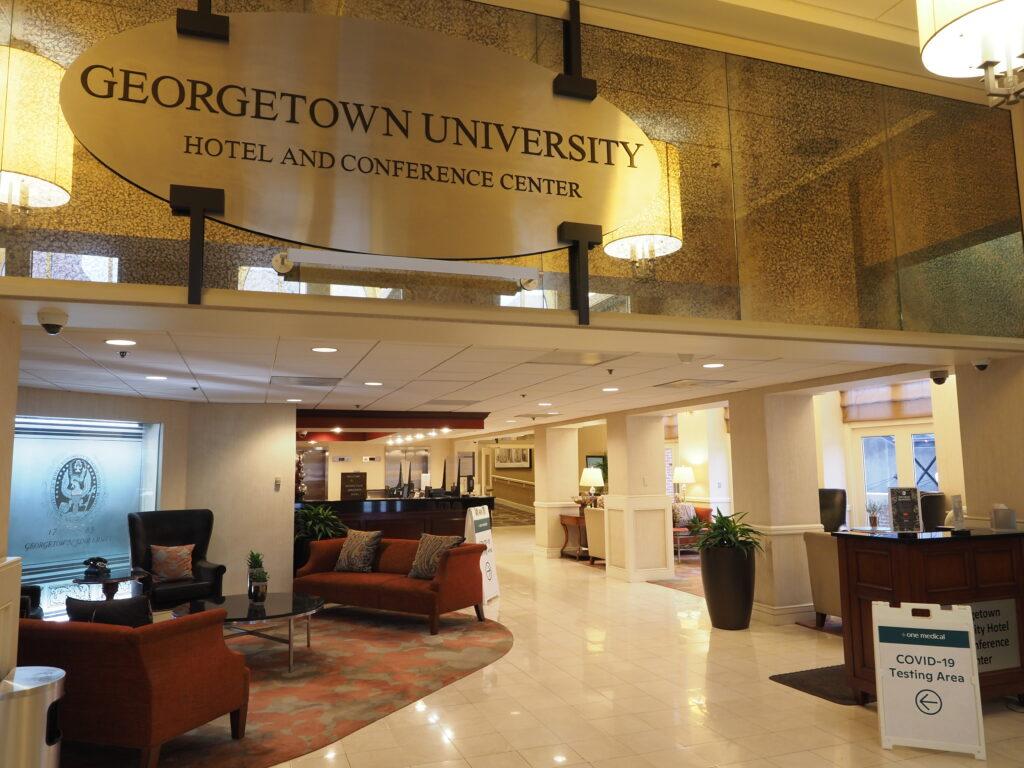Students who tested positive for COVID-19 have expressed safety and transparency concerns over Georgetown University’s isolation protocols.
While students who tested positive for COVID-19 in the fall 2021 semester isolated in the Georgetown University Hotel and Conference Center, this semester some students have been instructed to isolate in their on-campus residences. The change in procedure comes in anticipation of an expected surge in COVID-19 cases on campus due to the highly transmissible omicron variant, according to an email sent from Vice President and Chief Public Health Officer Ranit Mishori (MED ’02) to campus community members Jan. 5
Students should expect to isolate two to a room in the hotel or in their on-campus residence hall, according to the email. Students who test positive for COVID-19 are contacted by COVID Care Navigators, who provide guidance and support for students based on public health guidelines from the DC Department of Health and the Centers for Disease Control and Prevention (CDC).

After testing positive for COVID-19 on Jan. 11, Grayson Parisee (SFS ’24) said a COVID Care Navigator originally did not know where he would isolate, but ultimately told him to isolate for 10 days in his Village C West room because he had access to a private bathroom and because his roommate does not plan on returning to campus until his isolation period is over.
“I got a call from a COVID Care Navigator and she basically said to stay put and that they would figure out whether I would be staying in my dorm or they would be moving me to isolation. My understanding is that people who have access to their own bathroom and are not sharing their living space, they’re having them stay in their residence,” Parisee said in an interview with The Hoya.
Although the university has approximately 300 beds for isolation in the hotel, students who have access to private bathrooms and no roommates have been allowed to isolate in their rooms, according to a university spokesperson.
Parisee also received instruction from the Care Navigators to pick up refrigerated meals from the Harbin Patio. The university began delivering meals to students in isolation Jan. 14, according to a university spokesperson.
The university opted to use Harbin Patio as it was impossible to predict the number of students who would enter isolation upon arrival to campus, according to a university spokesperson.
Parisee said he was left confused about whether or not students in isolation are obligated to alert fellow students living in the residence hall about their COVID-19 status.
“I think some of the details are a little bit hard to get our heads around, you know what’s acceptable, what’s not, what’s expected, what’s not,” Parisee said. “Do I need to be putting gloves on to be going into the elevator, I don’t know. If somebody is standing in the elevator with me should I yell at them and say ‘Hey, I’m COVID positive,’ what does that look like?”
Students who test positive for COVID-19 are sent an email with what to expect during their isolation period, according to the spokesperson.
“The email includes an intranet site with detailed information and contact information, including who to contact about food and resources to support the emotional wellness of students,” the spokesperson wrote.
Delays in test results have also posed logistical issues for students; Maddie Morgan (NHS ’24) said she received a positive test result on Jan. 14, but did not hear from a COVID Care Navigator until the next day.
“It was like the next day but my test was a rapid test late Saturday night and then I just submitted it through GU360 and literally heard nothing the next day and it was noon so then I had to email the covidcarenavigator email thing and it was only after I did that that someone called me and told me to isolate,” Morgan wrote to The Hoya.
Elizabeth Smith (COL ’24), who tested positive for COVID on Jan. 11, said COVID Care Navigators contacted her within two hours of her positive test.
“I would say that overall I had a pretty quick process,” Smith said in an interview with The Hoya. “The Care Navigator I think got back to me within two hours of me submitting a positive test even before my PCR came back.”
Due to a surge of cases on campuses because of the omicron variant and delays in student responses to Care Navigator’s messages, there may be longer wait times between responses, according to the spokesperson.
The university must work to improve the clarity of COVID-19 policies, according to Parisee.
“Dorm buildings that have individual bathrooms makes it very likely that people will be isolating in their dorms so I think it is important that people know and that the university shares that that’s the guidance so people can make a decision of whether they want to be in their dorms right now or not,” Parisee said.
This article was updated on Jan. 21 to correct a passage which incorrectly stated the Harbin Patio space dedicated for meal pick ups was shared with the general public.




















